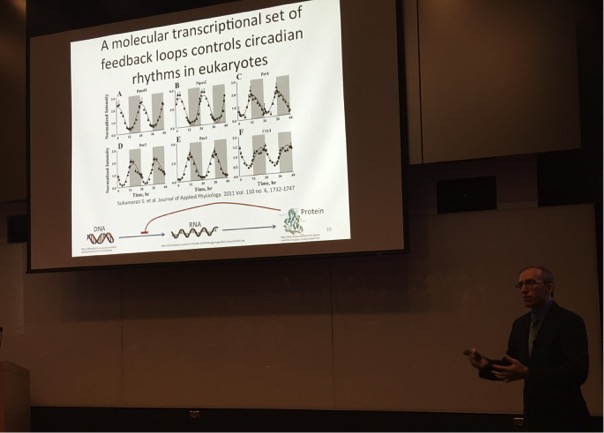Research
Circadian Rhythms
My main research program focuses on the creation of statistical methods to better understand circadian biology. I have developed several methods for the analysis of large-scale circadian datasets. Most of these datasets are plagued by 1) relative sparsity of time points, 2) relatively high noise in individual measurement, and 3) multiple time series compared.

Empirical JTK_CYCLE
JTK_CYCLE is a non-parametric rhythm detection method widely used in the field of circadian biology. We offer an improvment upon JTK_CYCLE, termed empirical JTK_CYCLE (eJTK), which calculates accurate p-values for rhythm detection, as opposed to over-estimates, and that is sensitive to asymmetric rhythmic waveforms.
Bootstrap eJTK
We introduce two new concepts to the field of rhythm detection: empirical Bayes calculation to increase the accuracy of variance estimation across replicate time points; and running rhythm detection on bootstrap replicates of the original experimental time series to calculate an average rhythmic strength. This allows for implicit inclusion of the ratio of noise to amplitude to rhythm detection.
Dependent P-values
We explain how two rhythm detection methods incorrectly assume independence of p-values in their calculations, which results in underestimation of p-values. We detail the reasons why p-value independence cannot be assumed for these methods and offer approaches to correct them.
Differential Rhythmicity
We introduce a method to explicitly assess whether two time series have distinguishable rhythmicities, improving on the previous method of solely looking at rhythmicity p-values. We show this approach is quantitatively and qualitatively different and preferable to others in the field.
Research Residency Application Talk
I am currently applying to Research Internal Medicine Residency programs. A copy of the talk I give can be found here.
Collaborations
My PhD work was undertaken under the guidance of Aaron R. Dinner. I have several ongoing collaborations with different experimental labs exploring circadian questions, including the labs of Ravi Allada, Joseph Bass, and Eugene Chang.